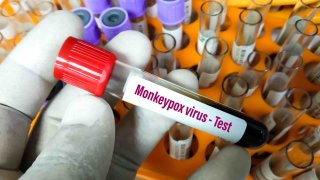
Officials with the County of San Diego Health and Human Services Agency identified a third probable case of monkeypox Friday.
The case, which is being forwarded to the Centers for Disease Control and Prevention for confirmation, is unrelated to the other two cases reported on Wednesday.
The person in this case, recently traveled internationally and is in isolation, is symptomatic and is doing well, said the HHSA.
The other two cases reported have not yet been verified by the CDC.
Get San Diego local news, weather forecasts, sports and lifestyle stories to your inbox. Sign up for NBC San Diego newsletters.
“All three individuals with probable cases of hMPXV here in the region are doing well and are managing their symptoms in home isolation,” said Wilma J. Wooten, M.D., M.P.H., County public health officer. “Most individuals who become infected experience mild to moderate symptoms and the risk of contracting the virus remains very low for the general population.”
Concerns over monkeypox were elevated in May because of cases that have popped up in unusual locations, such as the United Kingdom, Spain and Portugal. Monkeypox is usually found in parts of Africa. Cases in Europe and the U.S. are rare.
Local
As of Friday, the CDC has confirmed 113 monkeypox cases in 20 states and DC.
"The current monkeypox situation is constantly evolving and subject to change," the California Department of Public Health said after a case was reported in Sacramento last month. "CDPH is closely monitoring monkeypox transmission in the U.S. and California to ensure rapid identification of cases. The risk of monkeypox to the public is currently very low based on the information available."
Here's what to know about the disease rarely seen outside Africa.
What is Monkeypox?
Monkeypox is a virus that originates in wild animals like rodents and primates, and occasionally jumps to people. Most human cases have been in central and west Africa, where the disease is endemic.
The illness was first identified by scientists in 1958 when there were two outbreaks of a “pox-like” disease in research monkeys — thus the name monkeypox. The first known human infection was in 1970, in a 9-year-old boy in a remote part of Congo.
What Are Monkeypox Symptoms?
Monkeypox belongs to the same virus family as smallpox but causes milder symptoms.
Most patients only experience fever, body aches, chills and fatigue. People with more serious illness may develop a rash and lesions on the face and hands that can spread to other parts of the body.
The incubation period is from about five days to three weeks. Most people recover within about two to four weeks without needing to be hospitalized.
Monkeypox can be fatal for up to one in 10 people and is thought to be more severe in children.
People exposed to the virus are often given one of several smallpox vaccines, which have been shown to be effective against monkeypox. Anti-viral drugs are also being developed.
On Thursday, the European Centre for Disease Prevention and Control recommended all suspected cases be isolated and that high-risk contacts be offered the smallpox vaccine.



